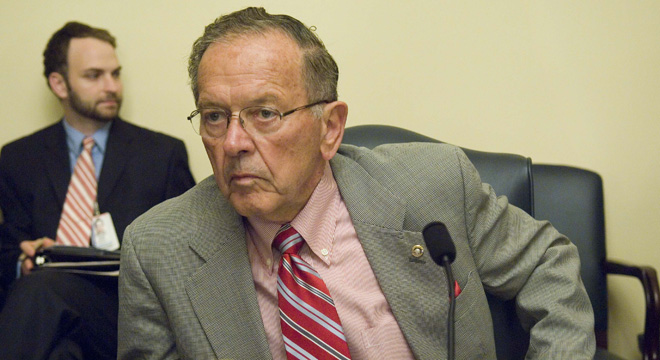Federal prosecutors handling the investigation of the late Sen. Ted Stevens knew one of their key witnesses had been accused of having sex with an underage girl. They knew that the girl had signed a false affidavit stating she did not have sex with that witness, Alaska oil businessman Bill Allen, after the girl’s roommate — a prostitute who had introduced Allen to the then-15-year-old girl — threatened to blackmail him.
Information they withheld about that allegation would have raised additional doubts about Allen’s credibility.
All of this comes via a special counsel report by Henry F. Schuelke made public Thursday, on the botched investigation and prosecution of the late Alaska Republican. The report said prosecutors “were permeated by the systematic concealment of significant exculpatory evidence which would have independently corroborated Senator Stevens’s defense and his testimony, and seriously damaged the testimony and credibility of the government’s key witness.”
There were conflicting accounts about whether Allen had pressured the girl to sign the affidavit or whether it was the 15-year-old girl’s idea. The government had taken the position in a previous case that Allen had “convinced” the girl to sign the affidavit. Yet prosecutors in the Stevens case said the teenager said she came up with the idea of signing the affidavit and told Stevens’ defense team there was no evidence to suggest otherwise. After the case fell apart, one prosecutor told investigators they believed the evidence about whether Allen had told the girl to sign the affidavit was “ambiguous.”
Allen was a friend of Stevens and ran VECO, which did much of the work on Stevens’ Gildwood residence that the government said was performed well below market costs and essentially amounted to a bribe. The Alaska Republican was charged with failing to disclose that information on this financial disclosure forms, though evidence showed he had requested a bill from VECO on several occasions. Allen was cooperating with the government as part of the FBI’s “Poison Pen” operation and had pleaded guilty to tax violations and bribing state lawmakers.
Before the trial got underway, officials in DOJ’s Criminal Division requested that prosecutors outline the “strengths and weaknesses” of the case. In April 2008, federal prosecutor Nick Marsh, who committed suicide in 2010, created a chart that mentioned Allen’s “shady personal background” as a ripe issue for the defense team.
Prosecutors even sent a Sept. 9, 2008 letter to the defense team that falsely stated that “the government is aware of no evidence to support any suggestion that Allen asked [Bambi Tyree] to make a false statement.”
The report said those “astonishing misstatements concealed the existence of documents and information” in the possession of three federal officials since at least October 2007.
“The government had every reason to want to avoid any cross-examination of Bill Allen on these issues,” Schuelke wrote. “Before the trial, Mr. Allen’s lawyer, Robert Bundy, told the prosecutors that if Mr. Allen was questioned about Ms. Tyree, he would assert his Fifth Amendment privilege and refuse to answer. Agent Kepner told DOJ investigators in 2009, that ‘ALLEN would become unglued whenever an article would appear involving allegations related to the APD sexual investigation.’ Deprived of the information that would have significantly impeached Mr. Allen’s credibility, Mr. Sullivan did not cross-examine him about APD’s past and pending sexual misconduct investigations or his relationship with Ms. Tyree.”
The Schuelke report also faults prosecutors for failing to disclose information that would have helped the defense’s argument that Stevens had asked to be sent a bill for the work on his home. Allen had testified at trial that a neighbor named Bob Persons had told him that Stevens was only requesting a bill because he was “covering his ass.”
The prosecutors named in the report disagreed with the conclusions and filed their own responses with the court. William Welch noted that the Office of Professional Responsibility concluded that Welch did not commit professional misconduct or exercise poor judgement.
Brenda Morris, who took charge of the prosecution at the direction of DOJ leadership just a few weeks before the trial, blamed that decision for the missteps that were made.
“My late assignment to the trial team sparked lingering tension and resentment among the team members,” wrote Morris. “This has been an extremely long and difficult process. While my intergrity was publicly questioned, I know that I have maintained my integrity throughout. I have been honest with the investigators and I have been honest with myself.”
A lawyer for James Goeke said the the decision “to rush the case to indictment and subsequently rush it to trial having been made at the higher levels of the Department of Justice, it fell upon the line level prosecutors like Mr. Goeke to have to deal with the insurmountable burdents such decisions created.”
The lawyer wrote that Goeke “worked grueling hours in a backroom, basically un-noticed and far from his family” and did his best under the circumstances.
“Faced with a lack of leadership, limited responsibility and time-driven chaos, Mr. Goeke did the best he could. He should not be made a scapegoat for Brady failures that were, in truth, caused by the prosecution team’s overall lack of leadership, planning, unwise delegation of responsibilies and disorganization,” the lawyer wrote.






